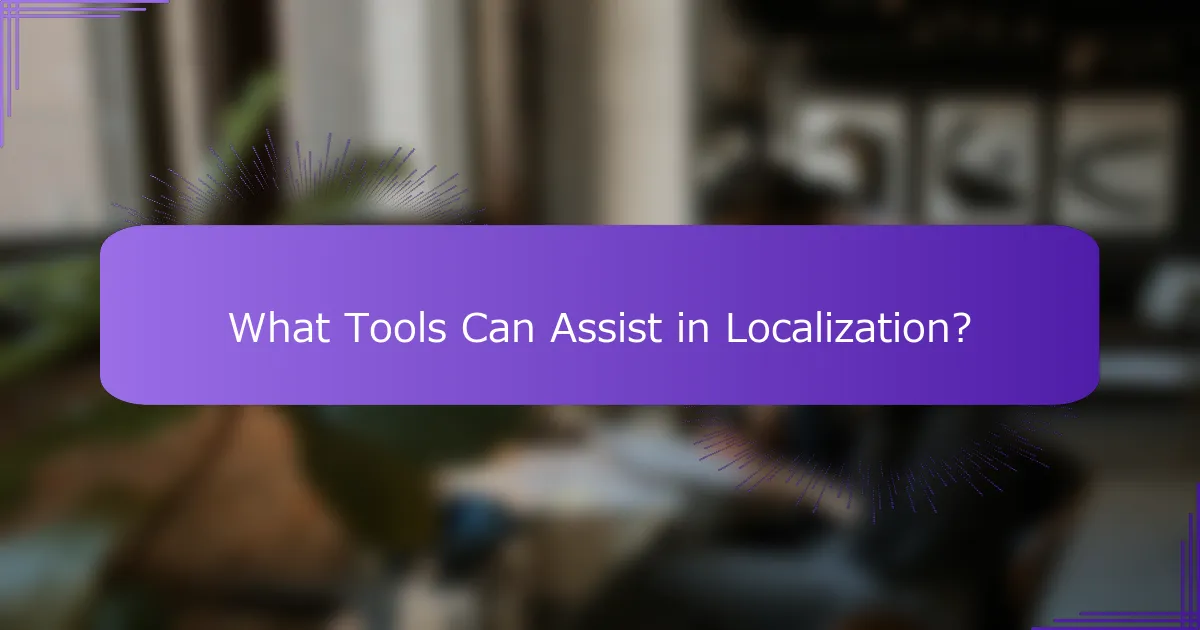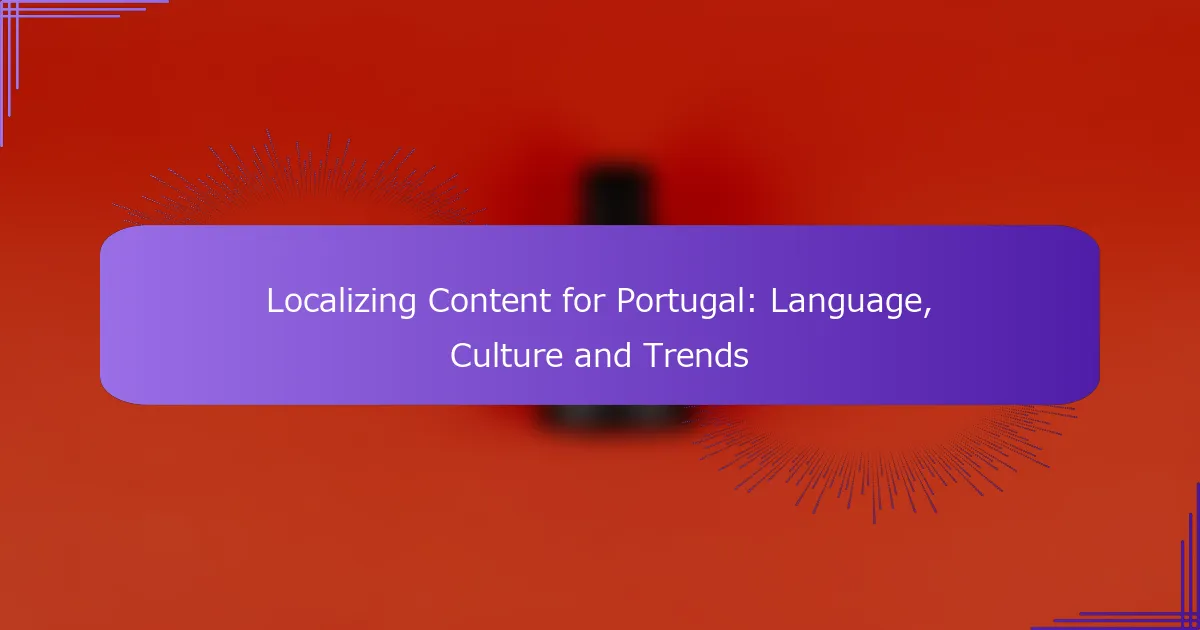Localizing content for Portugal requires a deep understanding of the local language, culture, and consumer trends. By adapting messaging to reflect cultural nuances and employing native language experts, businesses can enhance engagement and clarity. Additionally, recognizing regional dialects and current cultural trends is vital for creating relatable and impactful content.

How to Localize Content for the Portuguese Market?
To effectively localize content for the Portuguese market, it’s essential to adapt your messaging to resonate with local culture, language, and consumer behavior. This involves understanding cultural nuances, utilizing native language experts, implementing local SEO strategies, adapting visuals, and considering regional dialects.
Understand cultural nuances
Cultural nuances play a significant role in how content is perceived in Portugal. Familiarize yourself with local traditions, values, and social norms to ensure your messaging is respectful and relevant. For instance, Portuguese consumers appreciate authenticity and storytelling, which can enhance engagement.
Additionally, be aware of local holidays and events that may influence consumer behavior. Tailoring your content around these occasions can increase its effectiveness and relatability.
Utilize native language experts
Engaging native language experts is crucial for accurate translation and localization. These professionals not only translate words but also adapt phrases and idioms to fit the cultural context. This ensures that your content resonates with the target audience and avoids misinterpretations.
Consider hiring local copywriters or translators who have experience in your industry. Their insights can help you craft messages that align with local expectations and preferences.
Implement local SEO strategies
Local SEO is vital for increasing visibility in the Portuguese market. Start by researching keywords that are popular among Portuguese speakers, focusing on local search terms and phrases. Tools like Google Keyword Planner can help identify these keywords.
Additionally, optimize your website for local search by including location-specific content and ensuring your business is listed in local directories. This can significantly enhance your online presence and attract more local customers.
Adapt visuals and examples
Visual content should also be localized to appeal to Portuguese audiences. This includes using images, colors, and symbols that resonate culturally. For example, incorporating local landmarks or culturally significant imagery can create a stronger connection with your audience.
Furthermore, adapt examples and case studies to reflect local contexts. Using familiar scenarios makes your content more relatable and engaging for Portuguese consumers.
Consider regional dialects
Portugal has various regional dialects, which can influence language use and preferences. While standard Portuguese is widely understood, incorporating local dialects can enhance relatability in specific regions. Be mindful of these variations when localizing your content.
Conduct research to understand the dialects prevalent in your target market areas. This knowledge can guide your language choices and help you connect more effectively with diverse audiences across Portugal.

What Are Key Language Considerations for Portugal?
When localizing content for Portugal, it’s crucial to consider the linguistic and cultural nuances that define the region. Understanding the specific language variations, idioms, and cultural references will enhance engagement and ensure clarity for the audience.
Use European Portuguese
European Portuguese is distinct from Brazilian Portuguese, featuring unique vocabulary, pronunciation, and grammar. When creating content for Portugal, always opt for European Portuguese to resonate with local speakers and avoid misunderstandings.
For instance, the word “autocarro” is used in Portugal for “bus,” while in Brazil, “ônibus” is preferred. Such differences can lead to confusion if not addressed properly.
Avoid Americanisms
American English terms and phrases can alienate Portuguese audiences. Phrases like “elevator” should be replaced with “elevador,” and “truck” with “camião.” These substitutions help maintain cultural relevance and ensure that the content feels familiar to local readers.
Additionally, idiomatic expressions common in American English may not translate well. For example, “hit the books” should be avoided in favor of more universally understood phrases.
Focus on local idioms
Incorporating local idioms can significantly enhance the relatability of your content. Phrases such as “dar o litro” (to give your all) or “pôr a mão na massa” (to get your hands dirty) resonate well with Portuguese audiences and can convey messages more effectively.
Using idioms appropriately can also demonstrate cultural awareness, fostering a stronger connection with the audience. However, ensure that these expressions are relevant to the context to avoid confusion.

What Cultural Trends Should Be Considered?
When localizing content for Portugal, it’s essential to consider cultural trends that resonate with the local audience. Understanding and integrating these trends can enhance engagement and relatability.
Embrace local traditions
Incorporating local traditions into your content is vital for connecting with Portuguese audiences. This includes recognizing significant holidays such as Festa de São João in Porto or Carnaval, which are celebrated with vibrant festivities and community involvement.
Highlighting traditional customs, such as Fado music or local cuisine like bacalhau, can create a sense of familiarity and pride among readers. Use visuals and narratives that reflect these traditions to enrich your content.
Highlight popular local events
Portugal hosts numerous events throughout the year that draw significant local and international attention. Events like the Lisbon Book Fair or the Algarve International Film Festival are excellent opportunities to engage your audience.
Incorporate information about these events in your content, including dates, locations, and activities. This not only provides value but also positions your content as timely and relevant.
Incorporate Portuguese humor
Humor is a key aspect of Portuguese culture, often characterized by wit and irony. Using local idioms or playful language can make your content more relatable and enjoyable for the audience.
Be mindful of cultural sensitivities and avoid humor that may not translate well. Instead, focus on light-hearted jokes or references that resonate with the Portuguese experience, ensuring your content feels authentic and engaging.

What Tools Can Assist in Localization?
Several tools can enhance the localization process, making it more efficient and accurate. These tools range from software that manages translation workflows to advanced AI solutions that streamline the translation process.
Use translation management software
Translation management software (TMS) helps organize and streamline the localization workflow. It allows teams to collaborate effectively, manage translation memories, and ensure consistency across projects. Popular options include Smartling, Transifex, and Lokalise.
When selecting a TMS, consider factors like user interface, integration capabilities, and support for various file formats. A good TMS can significantly reduce turnaround times and improve the quality of localized content.
Leverage AI translation tools
AI translation tools, such as Google Translate and DeepL, can provide quick translations and assist in the localization of content. These tools use machine learning to improve accuracy over time, making them valuable for initial drafts or large volumes of text.
However, while AI tools can be helpful, they often require human oversight to ensure cultural nuances and context are preserved. Use them for preliminary translations, but always follow up with a native speaker for final reviews.
Employ localization platforms
Localization platforms combine various tools and services to facilitate the entire localization process. They often include features for translation, project management, and quality assurance, making them a comprehensive solution for businesses.
Examples of localization platforms include Crowdin and Phrase. These platforms can be particularly useful for companies looking to enter the Portuguese market, as they often provide resources tailored to local language and cultural trends.

What Are the Best Practices for Local SEO in Portugal?
To effectively implement local SEO in Portugal, focus on optimizing your online presence for local searches, utilizing tools like Google My Business, and building connections within the local community. These practices enhance visibility and drive relevant traffic to your business.
Optimize for local keywords
Identifying and using local keywords is crucial for improving search visibility in Portugal. Start by researching terms that potential customers in your area are likely to use, such as “best restaurants in Lisbon” or “plumbing services in Porto.” Incorporate these keywords naturally into your website content, meta descriptions, and headers.
Consider using tools like Google Keyword Planner or SEMrush to find relevant local search terms. Aim for a mix of short-tail and long-tail keywords to capture a broader audience while also targeting specific queries.
Utilize Google My Business
Creating and optimizing a Google My Business (GMB) profile is essential for local SEO in Portugal. This free tool allows you to manage your business’s online presence across Google, including search results and maps. Ensure your profile is complete with accurate information, such as your address, phone number, and business hours.
Encourage satisfied customers to leave positive reviews on your GMB listing, as these can significantly influence potential customers. Regularly update your profile with posts about promotions or events to keep your audience engaged and informed.
Build local backlinks
Building backlinks from local websites can enhance your authority and improve your search rankings in Portugal. Focus on obtaining links from local news sites, blogs, and business directories. Collaborating with local influencers or sponsoring community events can also provide valuable backlink opportunities.
Ensure that the backlinks are relevant and from reputable sources. Aim for a diverse backlink profile by engaging with different types of local content, such as guest posts, interviews, or partnerships with other businesses.
